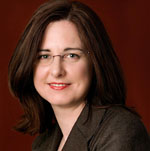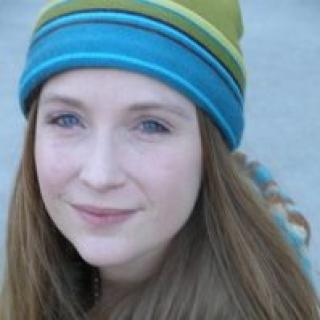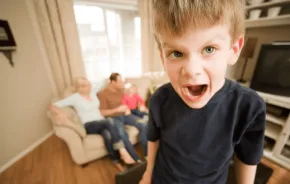
 Ashley Merryman, coauthor of the groundbreaking and influential book NurtureShock, will speak at Washington Cathedral in Redmond March 1, revealing research identifying hidden “thrive factors” for kids that will forever change parents' thinking about learning, creativity, and academic achievement. Learn more about the lecture and get tickets.
Ashley Merryman, coauthor of the groundbreaking and influential book NurtureShock, will speak at Washington Cathedral in Redmond March 1, revealing research identifying hidden “thrive factors” for kids that will forever change parents' thinking about learning, creativity, and academic achievement. Learn more about the lecture and get tickets.
We had a chance to speak with Merryman by phone about NutureShock and the topics she'll be covering in her upcoming talk.
In NurtureShock, you and coauthor Po Bronson set out to examine more scientifically the "received wisdom" of parenting. Can you share an example of how your own cultural and social expectations and assumptions were challenged?
All of them were! That was one of the goals of the book. We wanted to be able to correct the record and focus on those things that we got wrong. My rule of thumb for "does this go in the book" was when I got angry that I didn't already know it. As an example, on the topic of the importance of sleep: If you had told me ten, twenty years ago "This is what will happen if you don't get enough sleep" that would have changed my life. I worked in politics, and lived by the expression "You can sleep when you're dead." To have 17 of the world's 20 or so sleep experts confirm that you'll get it on the other end... Hey, that's not funny!
Everything we wrote about in NurtureShock has continued to be confirmed in the couple of years since we wrote the book. With respect to the content on sleep, there was a recent study released a couple of months ago that basically says getting more sleep is the equivalent of improving your child's teacher, because the more sleep a child gets the better able his brain is to process information. To me, those are freebies — if you get kids to get more sleep, you can change their lives metabolically, psychologically, academically. There is no downside. The reality is that children who get more sleep are likelier to have a healthier metabolism, a healthier mood and affect, and will be able to handle problems better. They will be able to retain more academically. I was angry I didn't know this! That was my standard: anger at not knowing. Had I known, I would have done things differently — for myself and others.
You run a free tutoring program for kids in inner-city Los Angeles — how did this process of discovering the latest science behind learning and development impact your work with those kids?
Very directly and constantly. Every time I learned something, I would change the way I tutored the next day. I am so much harder on them now! I'm tough! [laughs] I have changed the way I praise [the inverse power of praise is a core topic in NurtureShock], for instance. I won't be talking about praise in my lecture, but I will be talking about the role of self-control and self-regulation in academic achievement — those change your life's path. I have come up with ways to use Tools of the Mind concepts in tutoring kids. Simple things that change the game.
One of the things that separates the A student from the B student — or the C student from the D student — is not that the A student gets every answer right on the test. They don't. The difference is that when the A student walks out of the test and you ask them, "Hey, honey, how'd you do?" the A student responds: "I think I did pretty well. I got the first answer right, I struggled on questions two and three, and I'm not too sure about the last two, but think I got about half of it right." A different kid walking out of that same quiz hears "Hey, honey, how'd you do?" and says, "I don't know." They could get an A or an F — either way it is a genuine response. They haven't learned what the scholars term "meta-cognition" — which is the ability to sense inside that something doesn't feel right and think, "I should go check that."
And when you hand kids a corrected essay, say, you don't help them develop that gut instinct. Now when one of the kids in the tutoring program hands me an essay and asks for help correcting it, I say, "There is something funny in this line here... What do you think it is?" Nine times out of ten they know the mistake — they may not be able to fix it, but they can tell you what might be wrong — and if you help them with that one and then you keep working through, by the end of the paper, you have opened their eyes to look for these things.
And this meta-cognition, which can be cultivated, is just as relevant an issue for well-educated families as it is for families in different socio-economic situations. I think it actually might be more of a concern for the over-involved parent, because that person is very sure about catching all of the kid's mistake for the child. You must let kids make mistakes, find them, and figure out how to correct them.
That's just one example of how I apply the science to working with kids day-to-day.
How did you become involved in your tutoring program?
I go to a church in L.A. called Saint Agatha's, an inner-city parish. People were doing great things, mentoring kids, but the church school had closed years before, and people started talking about reopening it. A terrific plan was evolved, but it was going to take ten years. And I thought, that's all well and good, but what about the kids now? And after I said, "But who is going to help the kids now?" about a dozen times, I decided, well, I guess that should be me! So I asked the parish priest, and he said, "Sure!" That was January of 1998. At the time I was practicing law; also writing, but not about child development. But I knew how to read and I knew the kids didn't. It was literally a moral obligation. There is a core group of us who have been tutoring there for many years — we're still there. I have gone to the high school graduation of kids who started there in first grade.
You should write a book about them! Your tutoring kids!
Occasionally Po and I write about them — obviously with their permission. At this point it is just too personal, and I don't want anyone to think I am treating them like my props. When Po and I were doing our column for Newsweek online, I did mention a couple of the kids with their permission and they were very excited about it.
What other topics will you be speaking about at the March 1 talk?
In addition to speaking on a number of the thrive factors covered in NurtureShock, I am planning to uncover research and new studies that we didn't write about that I find interesting and relevant. So even if you've read NurtureShock, you still need to come! There will be new ideas and new things that I've learned, including a topic Po and I wrote about in a cover story for Newsweek a couple years ago on creativity and the decline of creativity, the so-called "creativity crisis." I will be talking about creativity and how we can develop that in children and perhaps ourselves. That will be another exciting aspect of the talk, for both those who are familiar with our work and not.
You and Po are working on a new book? Can you tell us what you'll be focusing on in this second collaboration?
It is going to be about the science of competition. The publication date is spring of 2013. We've been working on it for over a year already. The importance of competition is not winning — it is that it drives you to be the best you can be and shows you by comparison what that means. We are looking at such things as why some kids don't persist, developing resilience, and not being thrown by mistakes. It's so exciting!
Ashley Merryman's March 1 lecture will focus on the following 5 "thrive factors":
1. You'll learn how sleep affects children's psychological and emotional well-being. Just 15 minutes more of sleep can improve a kid's grade on a math quiz — an hour more of sleep can boost SAT scores 200 points.
2. Millions of families are fighting to get their kids into private schools and advanced programs as early as possible. But recent science has revealed that the screening systems used by most schools are missing the best kids, 73% of the time. So how much of this error rate is due to simply screening the children too young, before they’ve had a chance to develop, and how much is due to hidden factors that the tests are missing? In this speech, you’ll learn the exact answer.
3. You'll learn that some of the best ways to improve children's learning have nothing to do with academics — but self-control. And that the best way to develop that is through play.
4. We all realize that creativity is a vital factor for success, but research shows children's creativity is on the decline. The good news is that scientists also have discovered that creativity can be taught. You'll learn scientifically proven ways to help children develop their creativity (and maybe even your own!).
5. Brain fiber and moral fiber — what the latest research indicates about the early development of morals, gratitude, and other pro-social behaviors in children.











